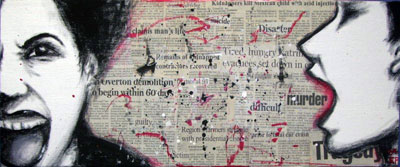All Nonfiction
- Bullying
- Books
- Academic
- Author Interviews
- Celebrity interviews
- College Articles
- College Essays
- Educator of the Year
- Heroes
- Interviews
- Memoir
- Personal Experience
- Sports
- Travel & Culture
All Opinions
- Bullying
- Current Events / Politics
- Discrimination
- Drugs / Alcohol / Smoking
- Entertainment / Celebrities
- Environment
- Love / Relationships
- Movies / Music / TV
- Pop Culture / Trends
- School / College
- Social Issues / Civics
- Spirituality / Religion
- Sports / Hobbies
All Hot Topics
- Bullying
- Community Service
- Environment
- Health
- Letters to the Editor
- Pride & Prejudice
- What Matters
- Back
Summer Guide
- Program Links
- Program Reviews
- Back
College Guide
- College Links
- College Reviews
- College Essays
- College Articles
- Back
Rwanda's Stance on Freedom of Press and Journalists
Country Name: Rwanda
Committee Name: Professional Freedom of Journalists
Position: Against; State Controlled
Since 2005, 563 journalists were killed according to the Committee to Protect Journalists. Out of these 563, 76 of them died in Africa. There has been many controversial debates on whether journalist should be controlled by the state, or have their own freedom. The UN General Assembly adopted its first resolution addressing the issue of impunity, condemning all attacks including killings, torture, harassment, and intimidation in all areas. This resolution urged member states to make change against violence against journalist. It ensured that all investigations of violence with journalist are given fair, speedy, and impartial trials, focusing on bringing the perpetrators to justice. Countries like the United States voted for the proposal that journalism should not be a state-controlled affair. On the other hand, Russia and China voted for more controlled journalism with extreme censorship. Russia, being one of forefront dictatorships against journalism, has silenced many journalists who have tried to expose Vladmir Putin and Russian officers for political corruption and war crimes. One example, Anna Plitkovskaya, was shot to death October 7th, 2006 in Moscow. Many suspect this was because she was writing a book exposing Chechen War Crimes. China does have a less firm grip on journalism, unless the writing is about the government. The country of China has extreme measures of security around government plazas such as Tiananmen Square. Anyone who has been accused of slander and heresy are jailed and forced to accept their sentence, pay a fine, go on probation, or discontinue their work. China itself is against freedom for journalist, but will speak in favor to further their strategic interests. Another major player in violence against journalism is North Korea. North Korea has been under harsh rule from the long line of dictators. Kim Jung-Un oppresses and silences reporters and journalists who try to expose the country for its poveristic laws. In North Korea, many of the broadcast systems such as radio, newspapers, and television shows have been abolished. The country of North Korea has not only banned journalism, but independent broadcast as well. Many debates have been set around whether professional freedom of journalists should be state controlled or self-censorship. Self-censorship is permitted in certain European countries and the United States. It allows journalist to revise their own writings and control what they publish. This puts the writer at his or her own risk of their publishings.
Rwanda is fully aware of the harassment, intimidation, and violence against journalist. Rwandan police make arrests and prosecutions for denouncement of public officials. The charges lead to maximum of five years in prison and fines of 10,000 francs, the Rwandan currency. Rwanda is deeply conscious of its economic environment, and the conversion rates of francs to USD. One American dollar is equal to 839.5 francs. The fine for divisionism, defined by “‘a crime committed by any oral or written expression or any act of division that could generate conflicts among the population or cause disputes,”’(FreedomHouse). In 2013, a law made in 2009 granted journalists many rights to broadcast information. No reforms were made recently leaving problematic clauses. The piece of legislation authorizes state rather than an independent body to determine rules. The minister of information and communication technologies will regulate and add to the list as more reliable sources become available. In UN debates, Rwanda notes with zest other countries that agree with state-controlled press such as: Russia, China, Sudan, and other African countries. Rwanda believes that all journalism should be state controlled or censored by the government.
Rwanda recommends that all countries have one or multiple positions to censor media. As of now, Rwanda has the minister of information and communication controlling and censoring media. The selected body of censorship will modify and discontinue any news sources that denounce, or disrupt the government. Rwanda will set a certain list of verified media outlets by 2025 or before. And before 2035 set the plan into effect, bearing in mind that any outside source will be prosecuted and charged. Rwanda is contemplating working with other governments, such as either Russia, China, or surrounding geographical countries that share the same problem. The entirety of the Rwandan police will back and support this process and make sure the entirety of the government cooperates, in hopes that other countries will pursue the status quo. Rwanda implores other governments to follow their lead in media censorship. Once Rwanda gets back on track, it will set a standard for African countries and regain its once lost power.

Similar Articles
JOIN THE DISCUSSION
This article has 0 comments.

This piece of writing was for a Model United Nations position paper, asuming a country's position on a current topic. This in no way, shape, or form, is a official government release, but rather a fun and interactive way to get involved with current problems.